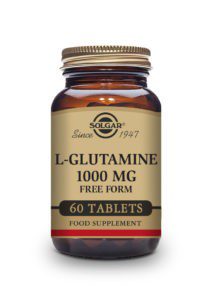




L Glutamine 1000mg 60Tablets Solgar
£21.00 Original price was: £21.00.£16.78Current price is: £16.78.
Out of stock
Email when stock available
L Glutamine
Solgar L glutamine , or just glutamine, is an amino acid. Amino acids are nutrients that help synthesize protein in the human body for nutrition. They can be found in protein-rich foods, including those from both plants and animals. Protein, in turn, is a necessary nutrient for good health.
L-glutamine is one of 20 different essential and nonessential amino acids that create proteins. Essential amino acids can only be acquired through food, while nonessential ones, like L-glutamin, are produced by the body. Under normal conditions, your body can produce enough L-glutamine to meet most of its needs.
Can L-glutamine help with IBS?
L-glutamine may help with irritable bowel syndrome (IBS). Tissues in the intestine use this amino acid as a fuel source to function well. L-glutamin also appears to have a role in maintaining proper barriers within the intestine.
IBS is one of the most common intestinal disorders.
Symptoms of IBS may include:
- bloating
- constipation
- cramping
- diarrhea
- general irregularity
- chronic stomach upset
- white mucus in stool
L-glutamine may help people who experience these symptoms regularly, or who’ve received an IBS diagnosis. In some instances, it’s believed that IBS itself could be the result of an L-glutamin deficiency.
It deficiencies can happen for a number of reasons:
- shock
- trauma
- major infections
- vigorous exercise
- radiation treatment
- chemotherapy
- significant stress
L Glutamine Benefits
It is the most common of the amino acids and is available in large amounts in your muscles. In fact, approximately 60% of the total amount of amino acid in the muscle is glutamin.
It is classified as a non-essential amino acid (e.g. it can be make in the body), but, as it provides fuel to your muscles, in certain situations the demand for glutamin increases and our body is not able to produce sufficient amounts.
For example, during intense exercise, glutamine stores are deplete because the body is place under stress and muscles and tendons require more of this amino acid. In this case, to minimize breakdown of muscle, glutamin needs to be obtain from the diet or through supplementation.
Natural sources of glutamine are grass-fed beef, wild caught fish, cottage cheese, asparagus and broccoli. Even if you make sure that you include glutamine rich foods in your diet, or even by topping up your glutamin levels from using whey powder, it can still be beneficial to take a supplement. L-Glutamine 1000 mg comes in a 1-2 tablets daily dosage.

















Reviews
There are no reviews yet.